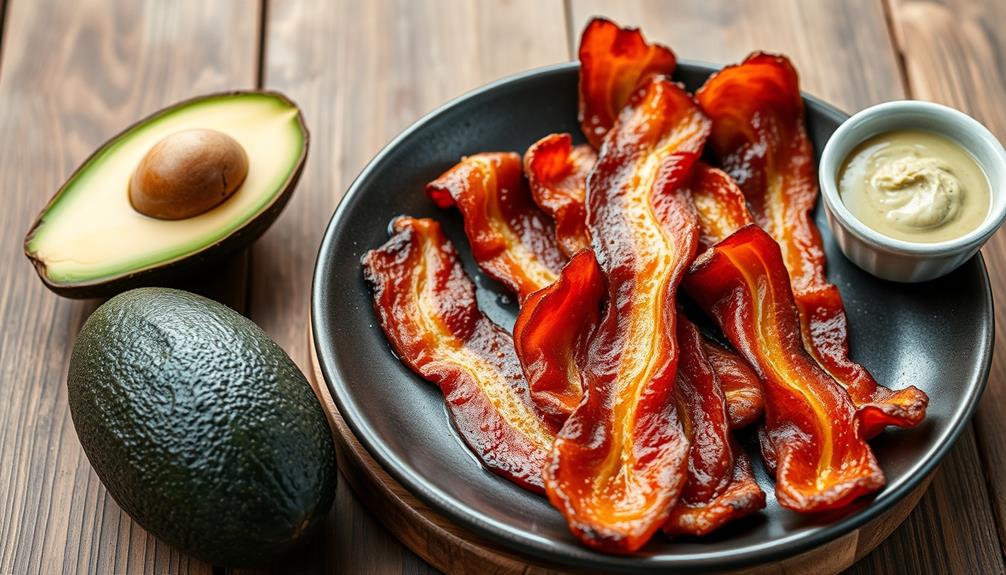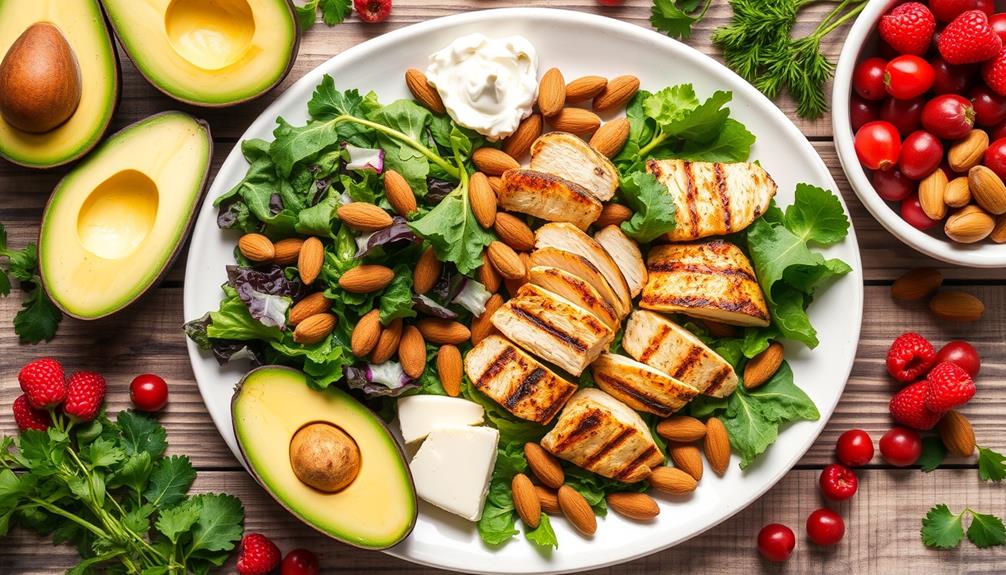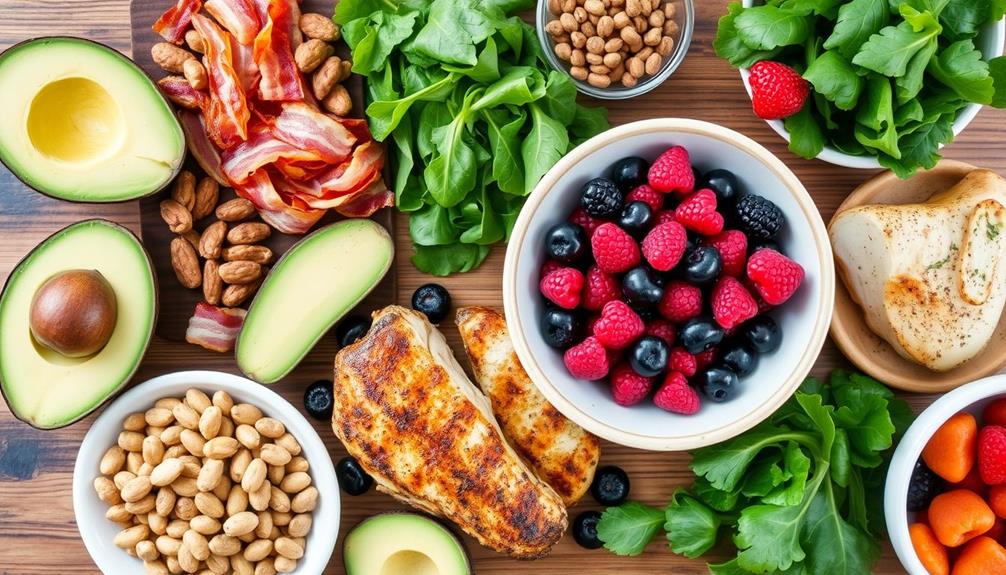Grapes aren't keto diet friendly. One cup contains about 27 grams of carbs, which can easily blow past your daily limit for staying in ketosis. Their high sugar content can spike your blood sugar, contradicting your keto goals. Even a small portion can quickly add up, making it hard to maintain your carb intake. You'll want to focus on low-carb fruits like berries or avocados instead. If you stay curious, you might find some creative ways to enjoy fruits while sticking to your keto plan without compromising your carb count.
Key Takeaways
- Grapes are high in carbohydrates, with approximately 27 grams per cup, making them unsuitable for a keto diet.
- Consuming grapes can lead to blood sugar spikes, contradicting the goals of maintaining ketosis.
- The keto diet typically limits carbohydrate intake to 20-50 grams daily, which can be easily exceeded by grapes.
- Low-carb fruit alternatives, like berries and avocados, are better choices for keto followers.
- Portion control is crucial; even small servings of grapes can significantly contribute to daily carb limits.
Overview of the Keto Diet
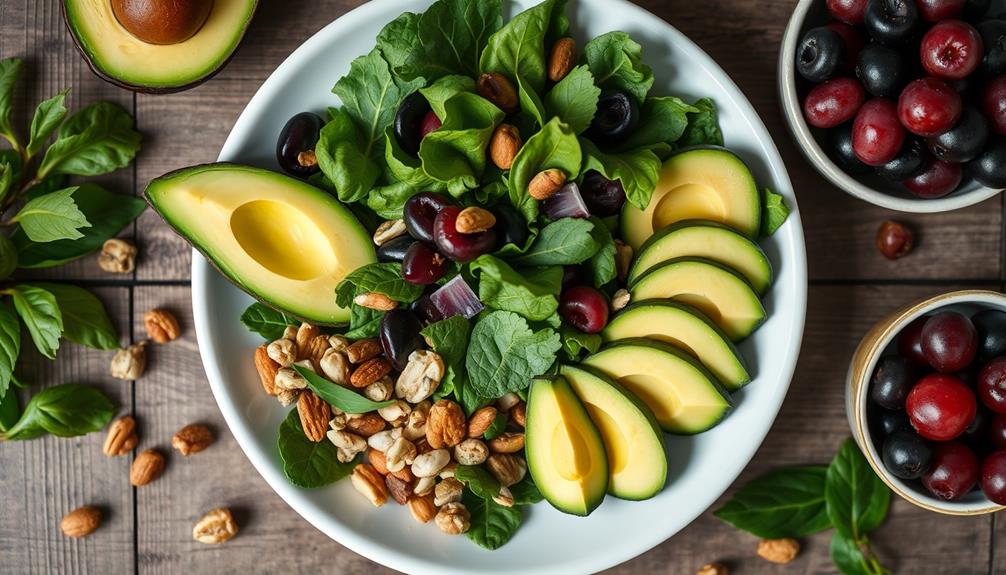
When you immerse yourself in the keto diet, you're stepping into a high-fat, low-carbohydrate eating plan designed to shift your body into a state of ketosis. This metabolic state allows your body to burn fat for fuel instead of relying on carbohydrates.
You'll typically restrict your carbohydrate intake to about 5%-10% of your total calories, which usually means consuming fewer than 20 grams of carbs each day. It's vital to note that certain foods, like fruits, can be particularly high in sugars and may impact your ability to maintain ketosis, making it significant to choose wisely. For example, while beetroot characteristics may be beneficial, they're often too high in carbohydrates for a keto diet.
Adhering to the keto diet involves a macronutrient ratio of approximately 70-75% fat, 20-25% protein, and only 5-10% carbohydrates. This means you'll focus on high-fat foods, such as avocados, nuts, and healthy oils, while avoiding high-carb options like grains and sugars.
It's critical to be mindful of daily carbohydrate limits to maintain ketosis and support your overall health. Additionally, you'll need to be aware of fruits to avoid, as many are high in sugars and can disrupt your metabolic state.
Consulting with a healthcare provider before starting the keto diet is recommended to guarantee it aligns with your individual health needs and to navigate potential side effects effectively.
Nutritional Profile of Grapes
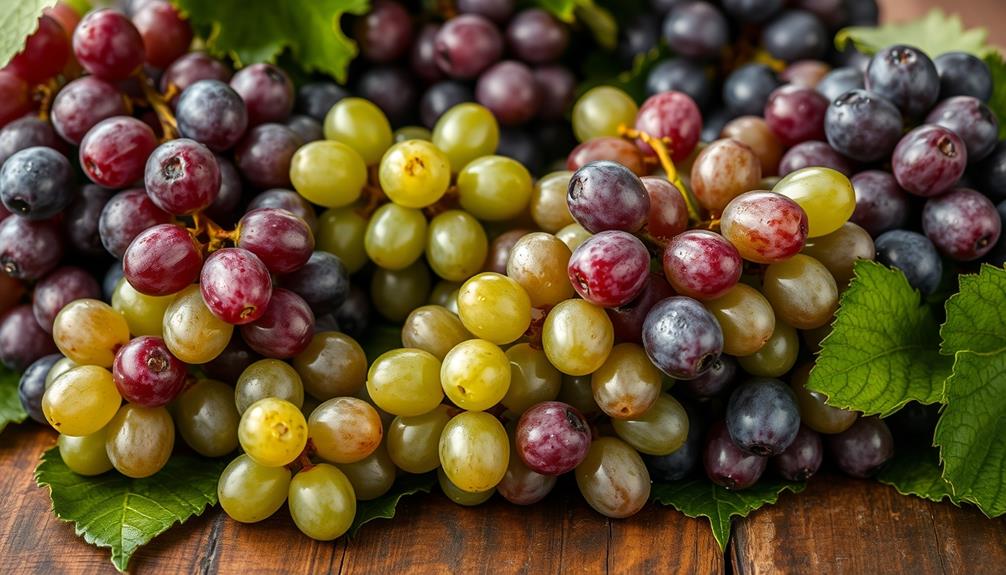
When you look at the nutritional profile of grapes, the carbohydrate content stands out, with about 27 grams per cup.
This high carbohydrate level can greatly impact your daily intake if you're following a strict keto diet, which typically limits carbs to around 20-50 grams per day.
While they offer some vitamins and antioxidants, those benefits may not justify the health risks for someone on a strict keto diet.
Let's break down how their carb load and sugar content can impact your keto journey.
Carbohydrate Content Overview
Grapes, while delicious and invigorating, come with a hefty carbohydrate price tag. If you're following a low-carb diet like keto, you might want to think twice before indulging. A single cup of grapes packs around 27 grams of carbohydrates, which is high in sugar and can easily disrupt ketosis. Even a few medium-sized grapes, each containing about 0.7 grams of carbohydrates, can add up quickly.
Here's a quick overview of grape carbohydrate content:
| Serving Size | Grams of Carbohydrates | Sugar Content |
|---|---|---|
| 1 Medium Grape | 0.7 grams | High natural sugar |
| 1 Cup of Grapes | 27 grams | Very high in sugar |
| 1/2 Cup of Grapes | 13.5 grams | High natural sugar |
| 1/4 Cup of Grapes | 6.75 grams | Moderate sugar content |
Due to their high natural sugar content, grapes can greatly contribute to your daily carbohydrate limit, making them a less than ideal choice for maintaining ketosis. So, if you're serious about your keto journey, it's best to skip the grapes.
Nutritional Benefits of Grapes
Many people mightn't realize that grapes offer several nutritional benefits, despite their high carbohydrate content. Grapes also contain a variety of vitamins and minerals that can support overall health, including vitamin K and several B vitamins, which are important for various bodily functions.
A cup of grapes packs about 18% of your daily recommended intake of vitamin C, which is essential for immune function and skin health. They're also a good source of dietary fiber, providing around 1.4 grams per cup. While this fiber aids digestion, it doesn't greatly lower the overall carbohydrate content, which is approximately 27 grams per cup.
For those interested in managing their carbohydrate intake, it's helpful to take into account cold medications overview that can affect appetite and metabolism.
Grapes are high in sugars, and this can lead to spikes in blood sugar levels. Because of this, they're generally unsuitable for a ketogenic diet, where carb intake should be limited to 20-50 grams daily.
However, the antioxidants found in grapes, such as resveratrol and flavonoids, may contribute positively to heart health and reduce inflammation, making them a beneficial addition to a balanced diet outside the restrictions of keto.
Health Risks of Grapes
Despite their appealing taste and nutritional benefits, grapes pose several health risks, particularly for those adhering to a ketogenic diet. With around 27 grams of carbohydrates per cup, grapes are high in sugar, making them unsuitable for keto. Each medium-sized grape contains roughly 0.2 grams of fiber, leading to a net carb count that can disrupt ketosis.
Additionally, understanding your investment goals can help you prioritize healthier food choices that align with your dietary needs. The high sugar content in grapes can cause spikes in blood sugar levels, which contradicts the keto diet's primary goal of maintaining low blood sugar.
Furthermore, grapes are low in healthy fats and protein, essential macronutrients for anyone on a keto diet. This lack of balance can hinder your weight loss efforts, as regular consumption of grapes may keep you from achieving your desired results.
Their carbohydrate density further complicates matters, as overeating grapes can lead to increased insulin levels, potentially stalling your progress. If you're committed to the keto lifestyle, it's vital to be mindful of the risks associated with grapes and prioritize foods that align better with your dietary goals.
Consider opting for low-sugar fruits and those rich in healthy fats instead.
Impact of Grapes on Ketosis
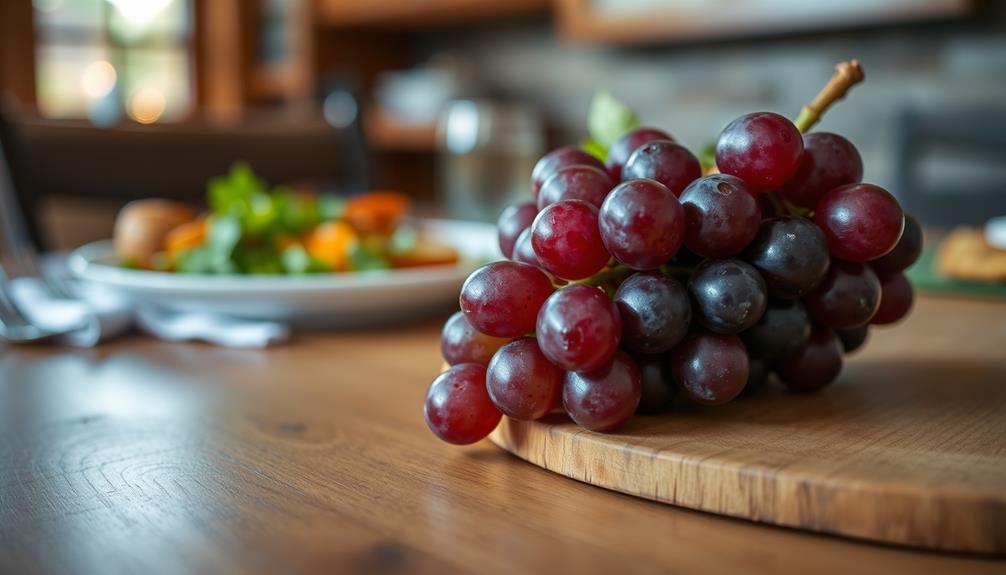
While you might enjoy the taste of grapes, their high carbohydrate content can pose a considerable challenge for maintaining ketosis. With approximately 27 grams of carbs per cup, grapes can quickly exceed your daily carb limits on a ketogenic diet, which typically restricts intake to 20-50 grams.
The natural sugars in grapes can spike your blood sugar levels, disrupting the state of ketosis that you're working to maintain. It's important to reflect on how effective strategies for weight loss can be impacted by your fruit choices on a keto diet.
Here are some key considerations regarding the impact of grapes on your keto journey:
- High-carb content: Grapes are among the highest-carb fruits.
- Blood sugar spikes: Their natural sugars can disrupt ketosis.
- Small servings count: Even a handful can contribute greatly to your carb limits.
- Hidden sugars: Grape-derived products like juice and raisins also contain sugars.
- Choose wisely: Opt for low-carb alternatives like berries, which are more keto-friendly.
In short, if you want to stay in ketosis, it's best to avoid grapes and focus on low-carb alternatives that align with your ketogenic diet goals.
Alternatives to Grapes on Keto

If you're looking for low-carb fruit options, there are plenty of tasty alternatives to grapes that fit your keto lifestyle.
Nutrient-dense choices like berries, avocados, and olives can keep your carbs in check while adding flavor to your meals.
Additionally, incorporating healthy snacks can be a great way to engage your creativity, similar to how educational construction toys for toddlers promote imaginative play.
Plus, you can get creative with snacks by incorporating shredded coconut or tomatoes for a satisfying crunch.
Low-Carb Fruit Options
When you're on a keto diet, finding low-carb fruit options can be a game changer for satisfying your sweet cravings without derailing your goals. Instead of reaching for grapes, consider these delicious alternatives that fit perfectly into your meal plan:
Experimenting with these fruits can be just as enjoyable as exploring different brewing methods for coffee, allowing you to discover unique flavors and combinations.
- Berries: Strawberries, raspberries, and blackberries offer 5-8 grams of net carbs per cup, making them a top choice.
- Avocados: With about 3 grams of net carbs per whole fruit, avocados are packed with healthy fats and fiber.
- Tomatoes: Surprisingly, tomatoes contain around 4 grams of net carbs per medium-sized fruit and are rich in vitamins and antioxidants.
- Olives: These tasty snacks provide 1-5 grams of net carbs per serving while being high in healthy fats.
- Lemons and Limes: Each fruit contains about 5 grams of net carbs and can enhance the flavor of your dishes.
Incorporating these low-carb fruit options into your diet not only helps manage your carb intake but also adds essential nutrients to support your overall health.
Enjoy experimenting with these fruits to keep your meals exciting and flavorful!
Nutrient-Dense Substitutes
Finding nutrient-dense substitutes for grapes on a keto diet can make a significant difference in maintaining your low-carb lifestyle. Instead of grapes, try incorporating berries like raspberries or strawberries.
They're low in net carbs, with raspberries containing about 1g of net carbs per 10 berries, compared to grapes' staggering 26g of carbs per cup. Additionally, using essential oils like peppermint oil can help enhance your overall well-being while on your diet.
Avocado is another excellent choice, offering healthy fats and only around 3g of net carbs per whole fruit, making it a nutrient-dense substitute. Olives are also a great option, providing about 1g of net carbs per 10 olives while being rich in healthy monounsaturated fats.
If you're looking for a revitalizing alternative, cherry tomatoes can fit the bill with about 4g of net carbs per 100g. They add flavor and variety without compromising your keto goals.
For those wanting something a bit different, shredded coconut is invigorating, containing approximately 5g of net carbs per cup and high in medium-chain triglycerides (MCTs) that support ketosis.
Creative Snack Ideas
Snacking on a keto diet doesn't have to be boring or restrictive, especially when you explore creative alternatives to grapes. You can still enjoy tasty, satisfying snacks that fit your low-carb lifestyle.
Here are some great options that provide healthy fats and fiber while keeping your net carbs in check: Plus, offering your furry friends healthy snacks like natural ingredients for dogs can enhance their overall wellness too!
- Almonds: With about 6g of net carbs per ounce, they're high in healthy fats and protein.
- Cucumber slices with guacamole: This combo offers a crunchy texture and is low in carbs, making it invigorating and satisfying.
- Celery sticks with cream cheese: At only around 2g of net carbs per serving, this is a perfect keto-friendly snack option.
- Raspberries: For a fruity treat, enjoy them at approximately 7g of net carbs per cup, rich in fiber and antioxidants.
- Cheese crisps or pork rinds: These crunchy alternatives to chips usually contain less than 1g of carbs per serving, ideal for maintaining ketosis.
With these creative snack ideas, you won't miss grapes and can enjoy variety while sticking to your keto goals!
Portion Control With Grapes

Portion control is essential for enjoying grapes while on a keto diet. Grapes are high in sugar, packing around 26 grams of carbohydrates per cup. To stay within low carb limits, you should limit yourself to about 10-15 grapes per serving. Keeping your total carbohydrate intake under 20-50 grams per day is critical for maintaining ketosis.
For those considering other investment options, strong customer support is also important in financial planning.
Even small amounts of grapes can greatly contribute to your daily carb intake, so tracking portion size is crucial. If you find it challenging to resist the temptation of eating more, consider using grapes as a garnish or mixing them in small amounts with other low-carb foods, rather than snacking on them alone.
If you're struggling to manage your grape portions, it might be wise to opt for a low-carb fruit alternative. These options can satisfy your sweet tooth without the risk of exceeding your carb limits.
Creative Uses for Grapes
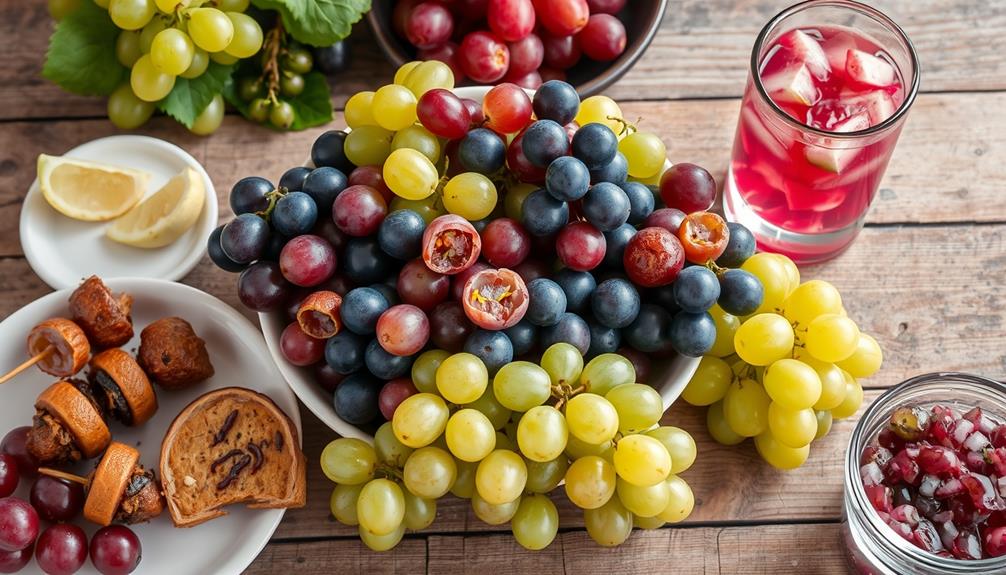
If you're looking for ways to enjoy grapes without overindulging, there are plenty of creative options. While grapes are high in carbohydrates, you can incorporate them into your diet in moderation to stay within carb limits.
Additionally, these ideas can enhance your overall wellness journey, as they allow for emotional resilience while enjoying food. Here are some keto-friendly ideas:
- Garnish salads: Use a few grapes to enhance the flavor of your salads or cheese platters without adding too many carbs.
- Frozen treats: Freeze grapes for a revitalizing snack, just be mindful of portion sizes to avoid exceeding your daily carb limits.
- Smoothies: Blend a small amount of grapes with low-carb ingredients like spinach and avocado to create a delicious smoothie while maintaining ketosis.
- Keto-friendly grape jam: Make a homemade version using erythritol or stevia as a sweetener, keeping portions small to stick to your carb restrictions.
- Fruit-infused water: Add a couple of grapes to your water for a hint of natural sweetness without a significant carb load.
These creative uses allow you to enjoy grapes while keeping your keto diet on track. Just remember to watch those portion sizes!
Summary of Key Points
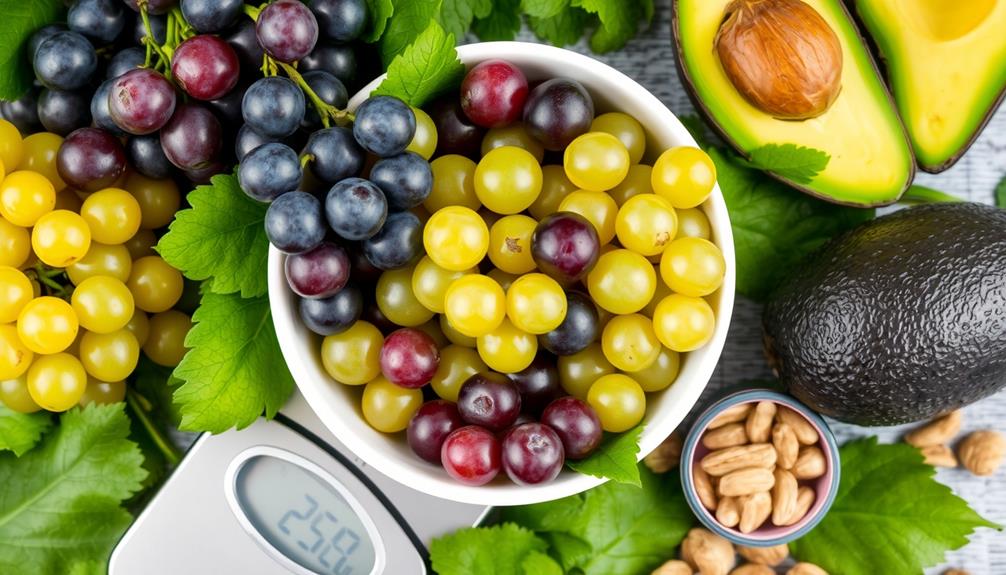
Grapes, while delicious, pose significant challenges for those adhering to a ketogenic diet. With approximately 27 grams of carbohydrates per cup, their high sugar content makes them unsuitable for anyone trying to maintain ketosis. The keto diet typically restricts carbohydrate intake to 20-50 grams daily; consuming grapes can quickly disrupt this balance and push you over your limit.
When you eat grapes, you risk experiencing blood sugar spikes, which contradicts one of the primary goals of the ketogenic diet—achieving stable blood sugar levels. Unlike keto-friendly fruits such as berries and avocados, grapes lack the low net carbs necessary for maintaining a ketogenic state.
For individuals committed to the keto lifestyle, it's best to steer clear of grapes and turn to low-carb alternatives. Options like strawberries, blackberries, or even avocados can provide the sweetness and satisfaction you crave while keeping your carbohydrate intake in check.
Frequently Asked Questions
How Many Grapes Can I Eat in Keto?
You should limit grape consumption on keto since they're high in carbs. Even a small serving can push you over your daily carb limit. Opt for low-carb fruits instead to maintain ketosis effectively.
What Fruit Can I Eat on a Keto Diet?
On a keto diet, you can enjoy low-carb fruits like berries, avocados, and olives. They provide essential nutrients without pushing your carb limits, helping you maintain ketosis while satisfying your cravings for something sweet.
What Fruits Are Not Keto Friendly?
Picture biting into a sweet, juicy mango or a crisp apple—tempting, right? But, if you're on keto, these fruits aren't your friends; they pack too many carbs for your low-carb lifestyle. Choose wisely!
Can You Eat Blueberries on Keto?
Yes, you can eat blueberries on keto, but be mindful of portions. Stick to about ¼ cup to keep your carb intake low while still enjoying their nutritional benefits. Balance them with low-carb foods for best results.
Conclusion
In the grand scheme of your keto journey, grapes might not be the best companion on your plate. While their natural sweetness is tempting, they can nudge you out of ketosis if you're not careful. Instead, consider other low-carb treats that keep your goals in sight. Remember, it's about finding balance; enjoy the fruits of your labor, just not the ones that might lead you astray. Choose wisely, and your keto adventure will thrive.


